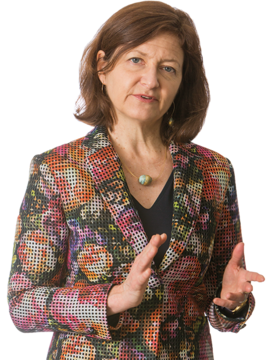Q&A: Deborah Prentice, Nassau Hall’s New No. 2
Princeton’s provost on faculty diversity, grading, and the academic calendar

How did you develop your scholarly interest in social norms and deviance?
I didn’t study social norms until I arrived here. Princeton was the first place I’d been that really functioned like the kind of face-to-face groups that social psychologists studied. It was clear that there were rules, but none of them were written. The process of learning the norms through observation and the feedback that you get from other people’s approval and disapproval — typically not expressed directly — I became very, very interested in that set of processes, how we know our social environments and how to behave in them.
You co-chaired the Trustee Ad Hoc Committee on Diversity, which issued recommendations in 2013. What progress has Princeton made since then?
The most notable progress that I’ve seen is how much diversifying the faculty and the graduate students is now in people’s consciousness. We’re seeing much greater efforts on the part of departments to bring in more diverse candidates.
Have you encountered resistance?
I have not heard any pushback on the idea that we will be better if we are more diverse — that diversity is key to us being at the cutting edge of progress in our scholarship and in our teaching and in our ability to serve our increasingly diverse students. You have to embrace the work, because you’re going to be doing it forever. My main goal now is to make sure we don’t slide back.
You’ve noted before that relations between Princeton faculty and administrators are unusually cordial. Why is that?
Honestly, because we have resources to do things. Scarcity does not breed cordiality, and hard decisions are tough on the fabric. We’re so lucky here. There are the day-to-day frustrations, but at base, people feel very fortunate to be here, and I think that helps a lot.
Last year, the Task Force on General Education recommended changing the academic calendar to administer exams before Christmas. What are the latest developments?
President Eisgruber put together an ad hoc committee to work out all the details. I expect we’ll hear more in the fall. I thought the task force made a convincing case that moving exams to before Christmas would give us some flexibility that we could use in all sorts of exciting ways. From my perspective, what’s important is that the process be one that is rigorous and that gives everybody a voice.
What’s been the impact of eliminating the University’s policy to stop grade inflation?
There’s certainly less noise around grading. I would be surprised if grades haven’t crept up; there is a tendency for grades to creep up, just because students don’t argue for lower grades. It’s really a trade-off: How important is it? What persuaded me that the policy should change was the amount of stress it created for students. There’s enough stress in life; we don’t need to make it more stressful. The fact that I’m hearing less about it means that students are less stressed-out about grades, which contributes to their learning and their experience and their happiness, and that seems all good to me.
As provost, what will some of your priorities be?
President Eisgruber has talked about sustaining our commitment to access for low-income students. That’s one of the great things we’ve done at this university in the last decade, bringing in students who would have thought they couldn’t afford it before and wouldn’t even have thought of applying. The next goal is adding another 500 students in the next decade. That’s a huge undertaking.
What role will you play as provost in the upcoming capital campaign?
I come up with all the things they’re raising money for! I actually enjoy fundraising. It’s fun to make the case for Princeton, and it’s also really interesting to hear what people find compelling, what resonates with them, how they imagine the future of this university. I will be engaged in those conversations.
Interview conducted and condensed by Deborah Yaffe











1 Response
Oona Miller Hanson ’97
8 Years AgoWinter, Not ‘Christmas,’ Break
I found it disappointing that both the interviewer and Dr. Deborah Prentice referred to “Christmas” when discussing the possibility of moving fall exams to before winter break — particularly following the question about the new provost’s former role as co-chair of the Trustee Ad Hoc Committee on Diversity. And for added irony, in the print issue, this interview directly followed the profile of Nusrat Ahmed ’17, the first Muslim class president. I’m so proud of the ways Princeton has worked to be a more diverse and inclusive institution. I hope PAW will work harder to reflect that important mission.